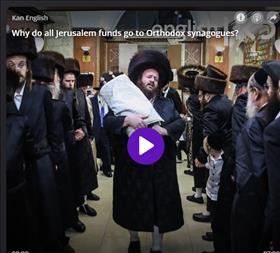Which religious institutions received 100 million shekels over 5 years?
Religious Discrimination in Allocation of Municipal Funds
Over the past 5 years the Jerusalem municipality has allocated NIS 100 million to religious institutions - and not even one shekel of this sum was allocated for Christian and Muslim communities or liberal strands of Judaism.
08/09/2022 23:18
Tags: Jerusalem · Jerusalem municipality · discrimination · funding

Photo: David Cohen/Flash90
This was reported on Sept 5th on the “Haboker Hazeh” (The morning news program) on the Public Radio station. Following Hiddush’s inquiry to the Jerusalem Municipality, it emerged that the funds were invested in Jewish mikvahs, synagogues and cemeteries.
We approached the municipality in cooperation with the Jerusalem Institute of Justice, on behalf of two churches in the Old City that are undergoing renovations. The churches would like to receive financial support; however it became clear to them that they do not meet the threshold conditions for submitting requests to the municipality.
Deputy Director of Hiddush - for Religious Freedom & Equality, attorney Sagi Agmon, says that "this discrimination is anchored in guidelines, some of which the municipality does not disclose and some of which were formulated intentionally in a way that excludes those whom the municipality does not wish to support."
Hiddush is currently threatening to take the matter to court.
Here is the link to KAN's radiobroadcast in which Mark Weiss spoke with Uri Regev, CEO of Hiddush.
Translation of article by Vered Pelman, KAN News
Over the past 5 years the Jerusalem municipality has granted NIS 100 million to religious institutions - all of them Jewish.
Vered Pelman – KAN News
Sept 5th, 2022
The funds were invested in 2016-2020 in mikvahs, synagogues and Jewish cemeteries. The data was revealed following an inquiry to the municipality by the NGO Hiddush for Religious Freedom and Equality. The NGO threatens to challenge [the discrimination] in court • Deputy Director of Hiddush: Discrimination is anchored in the municipal guidelines, some of which are deliberately written in a way that excludes non-Jews • Jerusalem Municipality: we are unaware of any requests for support that were submitted by non-Jewish religious institutions.
Between the years 2016-2020, the Jerusalem Municipality invested approximately 100 million shekels of support for religious buildings throughout the city, and not even one of them was for the non-Jewish sector. This was reported on Sept 5th on the “Haboker Hazeh” (The morning news program] on the Public Radio station. From the data, which was revealed following an inquiry to the Jerusalem Municipality by the NGO Hiddush for Freedom of Religion and Equality, it emerged that the funds were invested in Jewish mikvahs, synagogues and cemeteries. Hiddush is currently threatening to take the matter to court.
Between the years 2016-2020, the Jerusalem Municipality invested approximately 100 million shekels of support for religious buildings throughout the city, and not even one of them was for the non-Jewish sector.
The NGO approached the municipality in cooperation with the Jerusalem Institute of Justice, on behalf of two churches in the Old City that are undergoing renovations. The churches would like to receive financial support; however it became clear to them that they do not meet the threshold conditions for submitting requests to the municipality. According to Hiddush, the Jerusalem Municipality grants support to religious institutions within the framework of two tracks. In one track, 15 million shekels are distributed annually, however the criteria for their distribution remain unknown. The second track, according to the publication detailing criteria for support, is intended to assist with renovations and construction of synagogues. In 2022, this sum totaled five million shekels.
Deputy Director of the NGO Hiddush for Religious Freedom, attorney Sagi Agmon, says that this is discriminatory: "Every year the Jerusalem Municipality supports the construction and renovation of religious buildings in the city - 105 million shekels over the past five years, and of this huge sum not even a shekel is allocated to Christian, Muslim and/or non-Orthodox Jewish religious institutions". Agmon added that "this discrimination is anchored in guidelines, some of which the municipality does not disclose and some of which were formulated intentionally in a way that excludes those whom the municipality does not wish to support."
The Jerusalem Municipality responds: "The Jerusalem Municipality provides support for various institutions according to municipality guidelines and those of the Ministry of the Interior. The municipality publishes “calls for proposals” in multiple areas of activity – social, cultural, community, religion, and sports. The applications are then submitted for review and decision in the Allocations Committee."
"The municipality is unaware of any applications for support which were submitted by non-Jewish religious institutions. When the 2023 allocation cycle starts, and insofar as applications for support will be submitted from these institutions – they will be reviewed and evaluated according to the customary criteria and the rules for support."